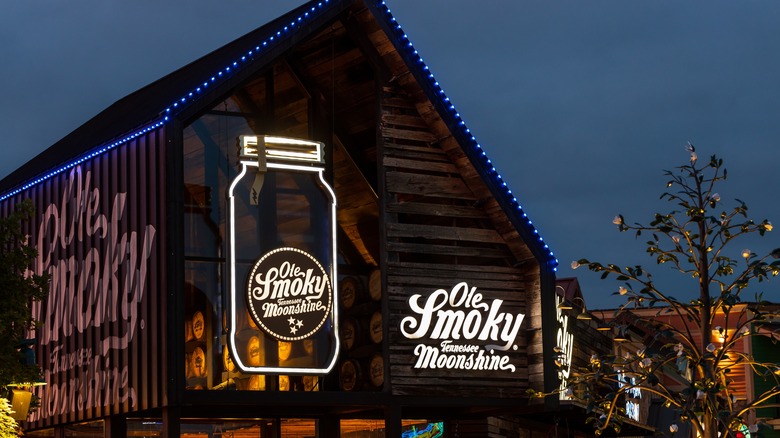Sorry, That Moonshine You Bought At The Liquor Store Is Definitely Not Legit
Commercial moonshine has a dirty secret they'd rather the rest of us ignore. The secret's not as scandalous as the ones moonshiners were keeping back during Prohibition — before the organized crime of the bootleggers evolved into the mafia. No, the drama revolves around the moonshine label itself.
You see, the term moonshine specifically applies to alcohol that is made illegally. In the United States, it typically refers to bathtub gin and whatever else rural distillers were cooking up at night during Prohibition. But commercial moonshine is legally produced and widely available. It's a contradiction in terms to produce illegal alcohol legally.
Moonshiners didn't go away after Prohibition was over. Depending on where you live (and what kinds of people you hang out with) you may have come across homemade moonshine in the form of a mason jar, possibly with fresh fruit soaking inside. More typical in the South and (to a lesser extent) the Midwest, moonshine is a cultural staple for many Americans. In an age where every aspect of our lives has become commercialized, it only makes sense that some savvy businesses would find a way to turn a profit on this alcoholic underdog. The only trouble is they're still calling it moonshine. Does this controversy amount to a technicality? Probably, but that doesn't mean people don't feel strongly about it. Nobody wants to see their culture turned into a gimmick.
Is moonshine nothing but a marketing ploy?
Even though moonshine is legal now, there is a glaring void of regulatory clarity around the term. Illegal alcohol can refer to anything from beer to brandy so long as it's outside the reach of the long arm of the law. These days, moonshine is typically either a white dog whiskey or a neutral grain spirit (like vodka). White dog is what people call unaged whiskey, in case you weren't familiar.
As far as we can tell, anyone can call their product moonshine with zero repercussions. If you're making bourbon, there's a greater market value to labeling your product as bourbon so a business isn't likely to take that option but theoretically, they could. White dog whiskey, on the other hand, doesn't have the same market appeal as bourbon which could help explain why many of the more popular white dog whiskey brands choose to label themselves as moonshine. This is an oversimplification and we aren't trying to suggest that every instance of a company producing moonshine amounts to clever marketing. That said, marketing tactics that aim to capitalize on moonshine culture are clearly at play.
It may seem odd for people who enjoy the free market economics of illegal moonshine to be griping about legal distillers butting in on their territory but this kind of framing misses the cultural connotations. True moonshine symbolizes defiance whereas legal moonshine is successful, compliant industries LARPing as bad boy outlaws. In other words, nothing new.

